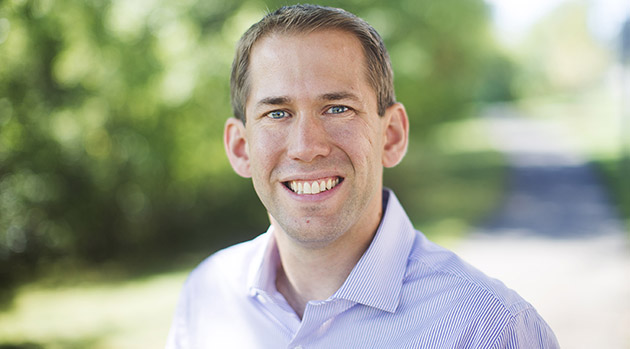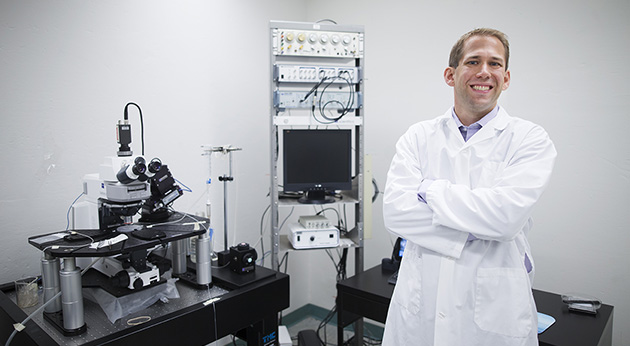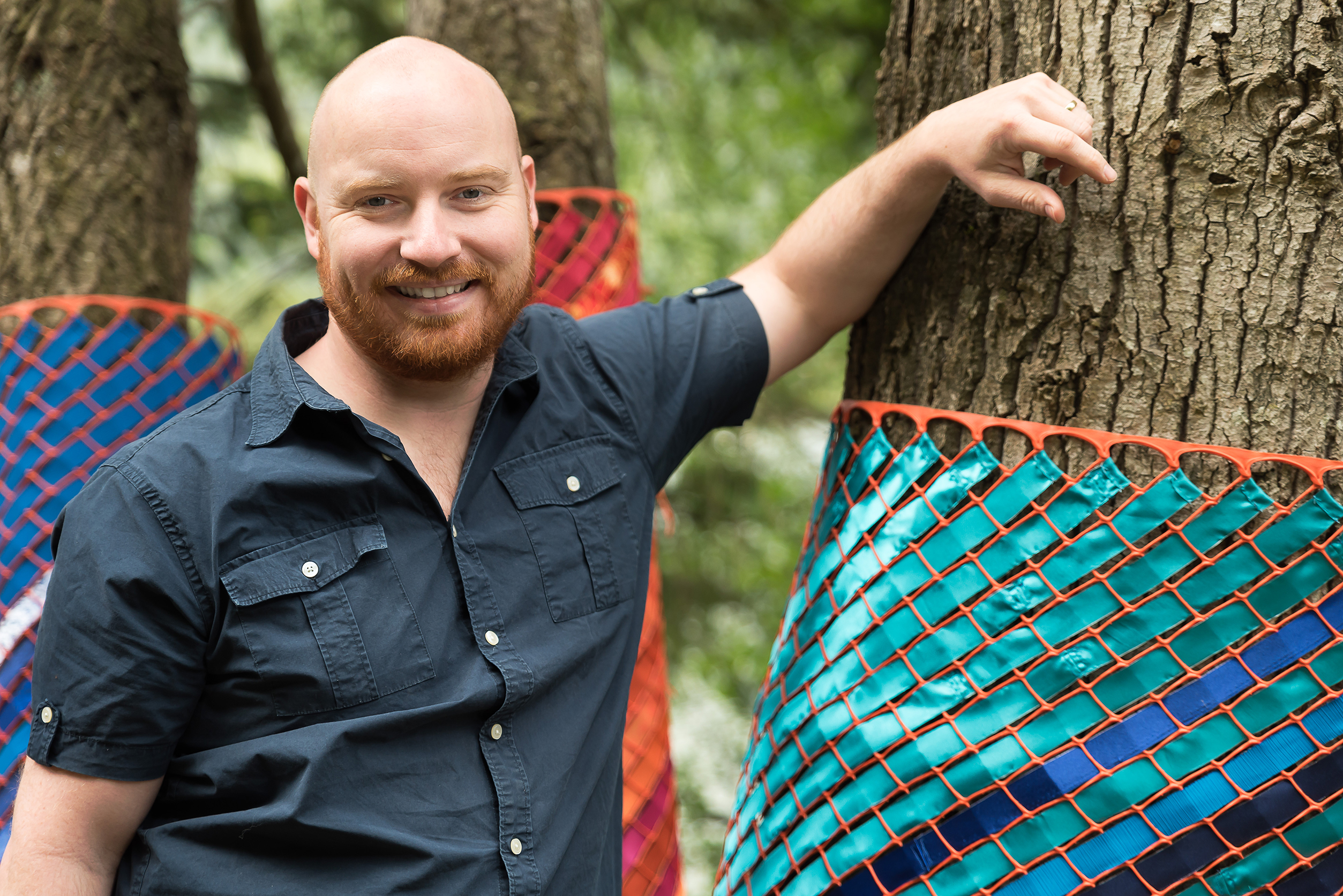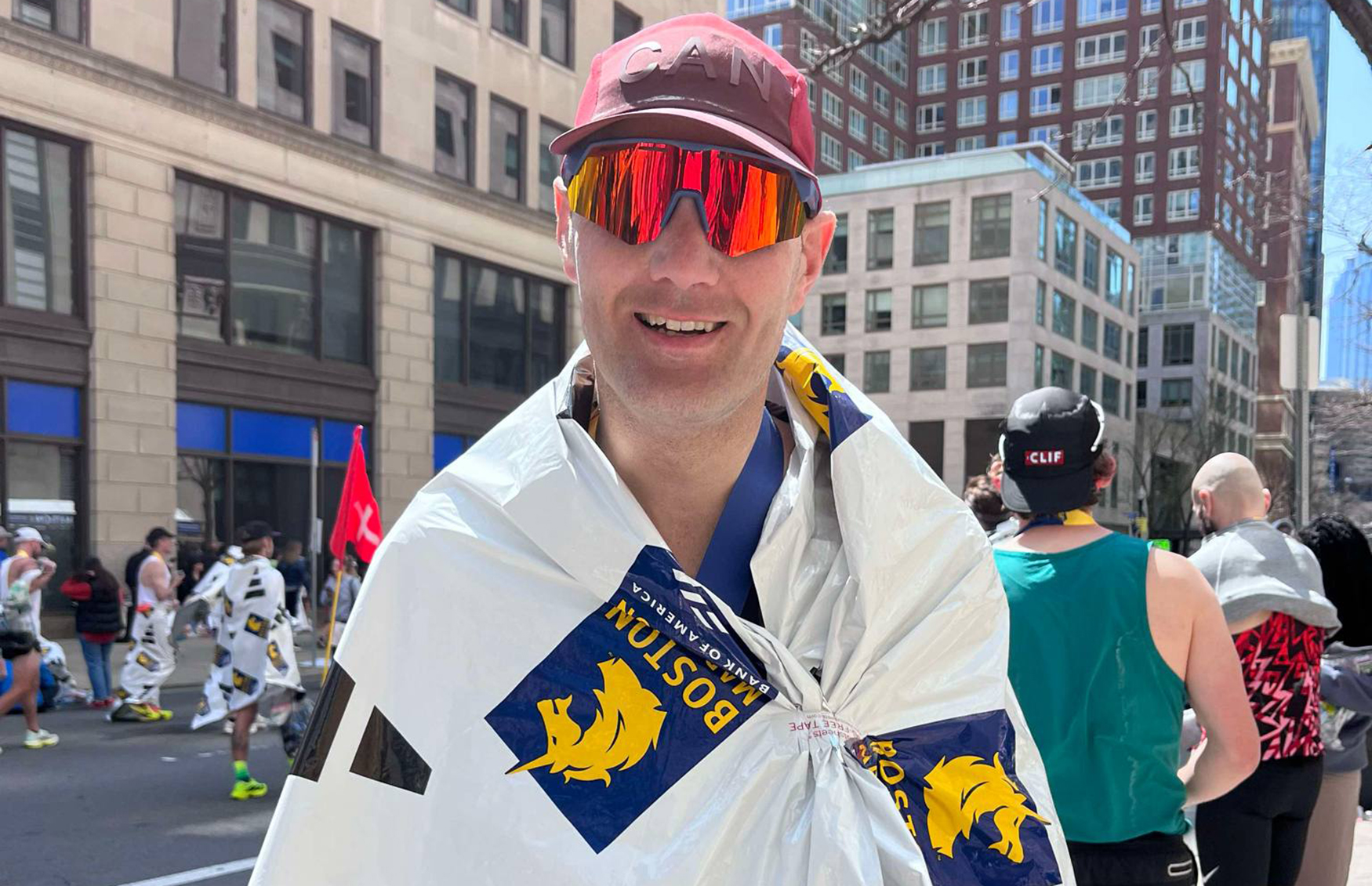Mentorship at UFV led to scientific success for Distinguished Alumni winner Mike Hildebrand
When Dr. Mike Hildebrand says he’s working in his lab at Carleton University, he’s speaking literally. The lab is named after him and it’s symbolic of his long journey and the path he has taken from UFV and the Fraser Valley farm where he grew up, to the chronic pain research he now leads.
This fall he returns to his hometown of Abbotsford and to UFV where he will be recognized as the Distinguished Alumni award winner for 2015.
Hildebrand, a 2001 graduate of UFV’s Bachelor of Science program, has followed a scientific journey that took him to the University of British Columbia for doctoral studies and a PhD, a post-doctoral industrial research fellowship with Zalicus Pharmaceuticals, and a research fellowship at Sick Kids Hospital in Toronto.
Since 2013 he has been a tenure-track assistant professor in the Neuroscience department at Ottawa’s Carleton University, running the Hildebrand Lab, which focuses on pain management.
During the course of his life he has met people living with chronic pain and they have become a motivating force.
“They really put a face on my research for me. I can think that maybe one day, they will be helped by the research I conduct.”
He has received almost $400,000 in research funding for his lab, including a $175,000 NSERC Discovery grant and a $140,000 Canada Foundation for Innovation grant.
And while it’s quite an achievement to have a research lab named after you (his proud mother took photos of the sign when she visited), what drives Hildebrand isn’t a desire for personal glory. It’s curiosity. That ever-present urge to ask why, or how, and then go and find the answers. Add a strong sense of community service and the drive to help others through teaching and scientific discovery and you have the secrets to his success.
When he began his studies at UFV in 1997, he didn’t know where his career would take him. He admired and was inspired by his teachers at Abbotsford’s Mennonite Educational Institute, and initially thought maybe he’d become a science teacher.
But he faced a major disappointment when his fiancée (now wife) Sara was accepted into teacher training, but he was not.
“At that point I perceived myself as a failure, but it was also one of my most important learning experiences. I learned about humility, and about not taking things for granted.”
At UFV, his professors saw his potential and wanted to open his mind to other career possibilities. Dr. Noham Weinberg of the Chemistry department invited him to spend a post-undergrad year conducting research in the UFV science labs. Hildebrand also worked with Dr. Tony Stea of the Biology department, resulting in his work being published in refereed science journals as an undergrad. He combined this research work with volunteer teaching at his former high school while he planned the next step in his journey: a successful application to graduate school at the University of British Columbia.
“I didn’t know much about graduate school opportunities or advanced research opportunities. That year really opened my eyes. Working in theoretical chemistry with Noham stretched me in ways I hadn’t stretched before. Once I started grad school I continued working on a project focused on neuro-scientific research that I had started in my final year of undergrad studies with Tony, and he visited me in the lab several times at UBC to help me troubleshoot problems.”
His mentors at UFV connected Hildebrand with Dr. Terry Snutch at UBC, who he worked under while conducting his doctoral research.
“Terry was a fabulous mentor. Working with him I learned how to think big and really become a scientist. He gave me the freedom to reach out and collaborate with other researchers, and bridged me into my post-doctoral work in an industrial research setting, which provided me with critical skills and rounded me out as a researcher.
“It was at this stage that I really took the plunge and realized that I wanted to focus on the area of spinal cord research. There were a lot of big questions still not answered and I saw a real opportunity to do important work there.”
The inability to effectively treat and manage chronic pain is one of the major public health challenges facing Canada today. In order to develop better drugs to treat chronic pain, researchers need to understand what goes wrong at a molecular and cellular level. The spinal cord is an essential component in the pain transmission pathway and the Hildebrand lab explores how chronic pain works in this area. His lab is also investigating potential molecular connections between chronic stress, depression, and chronic pain.
“Our hope is that our program will train future health care professionals and researchers in Canada and lead to the discovery of pain-producing molecules best suited as potential targets for new chronic pain drugs,” he notes.
Hildebrand has strong family roots in the Fraser Valley where he grew up on a chicken farm run by his parents and where his father also worked as a machinist.
“My family did not have an extensive educational background, but they valued knowledge and learning and taught us to be curious about the world around us.”
It was a long process becoming the research scientist he is today and he could not have made the journey without help from others.
“I was slowly transformed by the mentors who invested in me, both at UFV and during my PhD studies.”
Now that he’s a professor, he’s experiencing the other side of the mentoring relationship.
“Now I’m experiencing the joy of mentoring undergrads. I don’t just teach them — I learn from them too. Teaching is not always linear! It’s fun to be on the other side, guiding new scientists. I’m really realizing the importance of mentors now that I am one. They are invaluable for the advice they give and the advocacy they do on your behalf.”
Dr. Tony Stea of UFV’s Biology department is delighted that Hildebrand has been named the Distinguished Alumni winner for 2015.
“Mike is the best student I have ever had the pleasure of teaching and interacting with in more than 20 years of teaching. He excelled in his marks (straight A student), but he was also able to critically evaluate and question course information. He was an excellent public speaker and was well-liked by other students.”
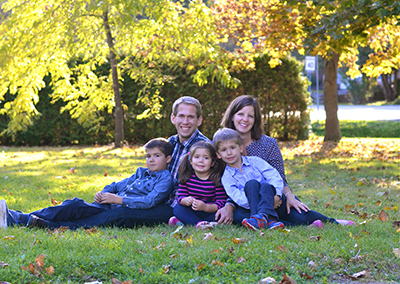 Hildebrand is now 36, and he and his teacher wife Sara are happily settled in Ottawa with their three children. He is looking forward to returning to the Fraser Valley for the Distinguished Alumni award ceremony, which will take place at UFV’s Town and Gown gala dinner on the Abbotsford campus on November 12.
Hildebrand is now 36, and he and his teacher wife Sara are happily settled in Ottawa with their three children. He is looking forward to returning to the Fraser Valley for the Distinguished Alumni award ceremony, which will take place at UFV’s Town and Gown gala dinner on the Abbotsford campus on November 12.
-30-


